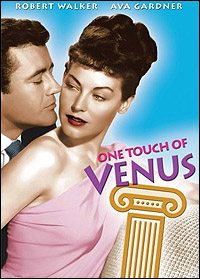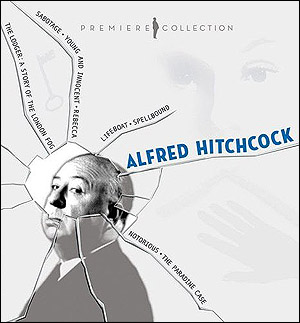
*
If it's "Mister Roberts" you want, the logical choice is to turn to the 1955 motion picture version starring Henry Fonda, James Cagney and William Powell, with the young Jack Lemmon stealing his scenes (and an Oscar) for his performance as Ensign Pulver. This was a Hollywoodized version of the award-winning play by Thomas Heggen and Joshua Logan, and not exactly an untampered transfer of the material. Still, it had Henry Fonda repeating the stage role that fit him so well; to many, he remains the one and only Mister Roberts. A second alternative has become available with the DVD release of the 1984 made-for-TV version of the play, filmed live in front of a studio audience. This gives you Mister Roberts [Acorn] more or less as written, which is perhaps a more effective reading of the play than the film version is. However, and it's a big however, you don't get Fonda, Cagney, Powell and Lemmon; what you get is, for starters Robert Hays as Lt. JG Doug Roberts. You know, Robert Hays, famous for — what? "Airplane"? And "Airplane 2"? Which doesn't exactly give him the stature of Hank Fonda, who not only brought with him decades of stardom but two years of playing Roberts on stage. Howard Hesseman, another star for 1984 TV purposes, doesn't offer much in the role of Doc. They did at least have two stage actors on hand, Charles Durning (as the Captain) and Kevin Bacon (as Pulver, just after "Footloose"). Durning and Bacon, needless to say, are as watchable as they always are; and director Melvin Bernhardt — who worked magic on the stage productions of The Effects of Gamma Rays on Man-in-the-Moon Marigolds, Da and Crimes of the Heart — does a sturdy job considering the star he was (presumably) handed. But given a choice, I'd stick with Fonda and Lemmon in Hollywood.
 |
Here comes yet another Hitchcock box, this one called the Alfred Hitchcock Premiere Collection [M-G-M/Fox]. Who comes up with these names? Premiere Collection? Classic Collection? Essential Collection? Masterpiece Collection? There already is, indeed, a Hitchcock Masterpiece Collection, but this Premiere one might well be described as a masterpiece of a set. Because the "Alfred Hitchcock Premiere Collection," by any name, is a Hitchcockian holiday. Not the sort of holiday for those of you who like to sit by the shore sippin' Margaritas thru a straw, traverse mountains and ford streams, or bicycle through Tuscany; but a holiday nonetheless.
Eight films are here, count 'em, representing a considerable slice of the master's 50-odd features. Prime among the suspects in the Premiere lineup is Alfred's first American film, a true winner (and an Oscar winner as well), "Rebecca" (1940). Welcome to Manderley, and all that. Larry Olivier, Joan Fontaine, George Sanders, and that swell Dame Judith Anderson who gives what might be one of the chillingest performance ever as Mrs. Danvers, the lady of the house or mistress of the mansion or keeper of the keys or whatever you want to call her. I had intended to get to the part about how these movies have been remastered after listing all the films, but it's hard not to comment on how good "Rebecca" looks in cleaned-up fashion. Here are Hitchcock's visuals, in their full glory on your widescreen.
"Rebecca" has been surpassed in my affections, lately, by "Notorious" (1946). Cary Grant, Ingrid Bergman (who as the film was released was in rehearsal for her Tony Award-winning portrayal of Joan of Lorraine), Claude Rains the Nazi and that mother of his: Madame Konstantin is how she bills herself, and she makes Judith Anderson look like Pollyanna's grandmother. Well, not quite. Anyway, they go running around Rio as Master Alfred builds the suspense. What that man can do with an ice bucket full of champagne, a key, and a wine bottle full of vintage Macguffin! "Lifeboat" (1944) has its chills as well, and Tallulah too. That's the one where the boat goes down and the survivors do their best to survive with yet another Nazi on board. Would you like to be stranded in the North Atlantic with Tallulah? (This is the one item in the set that has not been remastered for the occasion; they include the version that was expertly cleaned up for release in 2005.) Ms. Bergman is joined by Gregory Peck for "Spellbound" (1945), which is mighty interesting and includes some startling visuals (hello, Dali) but has nevertheless always left me lukewarm. Here, too, is "The Paradine Case" (1947), a real clinker despite or because of Peck, with no less than Charles Laughton and Ethel Barrymore in support.
That leaves us with three earlier films from Hitch's London years, and they just might be the real prizes of the box. Two of them are somewhat familiar thanks to countless public domain-releases, with prints so muddy that you sometimes feel like you're watching them through a London fog without the bracing mist in your face. The third is the earliest, and the film which more or less put the young and strange director on the map. "The Lodger: A Story of the London Fog" (1927) was a silent, but just watch how the Hitchcock touch unfolds, with the director displaying that uncanny ability to grip the patrons. The Lodger in question, by the way, is along the lines of that Ripper called Jack. The folks at M-G-M/Fox have given us two different musical soundtracks, both of which suit and enhance the onscreen action as a musical soundtrack should. "Sabotage" (1936) is arguably the most terrifying of the Hitchcock films. (This is not to be confused with "Saboteur" — the one with Bob Cummings and the Statue of Liberty — which I happen to like considerably more.) "Sabotage" stars Sylvia Sidney, although what she was doing in London at the time I don't know. Hitchcock in later years apologized for building suspense by having an innocent boy deliver the bomb; it's a bad idea, he here learned, to kill off a sympathetic character. The apology, in itself, served only to draw more attention to the episode. For here we are, 72 years later, talking about it.
Finally comes "Young and Innocent" (1937) not an all-time great but among my dozen or so favorite Hitchcocks due to a contrivance. Namely, that amazing tracking shot that caps the film. One almost wonders whether the director devised the whole thing, simply so he could build to this moment: The killer is on the loose, and has been tracked to the ballroom of a seaside resort. The heroine doesn't know what this fellow looks like; only that he has a violent twitch. Hitch starts his shot high in the air, outside the door. The camera moves up, over the walls and into the ballroom, and combs the crowd. The camera continues — this is all one shot, lasting a full 70 seconds — surveying the assemblage, finally landing upon the jazz band (in blackface). Then the camera starts closing in, closing in, until it lands on one of the musicians. Closeup on his face, in greasepaint, and then we get it — a twitch! A violent twitch. To compound this masterful shot, Hitchcock plays a grand trick on us all. The bandleader is singing as he conducts, and the lyric to this pop tune — which we listen to innocently enough, for these 70 seconds — is clearly and specifically telling us the identity of the murderer! Only we don't know it until that final, twitching moment. "Young and Innocent" can't really compare to "Suspicion," "North by Northwest," "The 39 Steps," "The Lady Vanishes,' "Shadow of a Doubt" or any number of the others; but I've watched this film again and again, just to relish that shot and the way Hitchcock builds up to it. And now, with the remastering, we can more clearly see what the director determined we should see.
The typical array of bonuses includes commentary by a slew of film historians; excerpts from two sets of Hitchcock audio interviews, one with Peter Bogdanovich and the other with Francois Truffaut; "making of" features on five of the eight; related features and interviews, including a Hitchcock-Salvador Dali piece; numerous "radio play" versions of the films — "Rebecca" alone has one with Orson Welles, one with Olivier and Leigh, and one directed by Cecil B. DeMille; and more. I'm kind of fascinated by the "restoration comparison" feature on most of the films, which takes a few scenes and provides side-by-side before and after footage. The big three — "Rebecca," "Spellbound" and "Notorious" — are available for purchase separately.
 |









